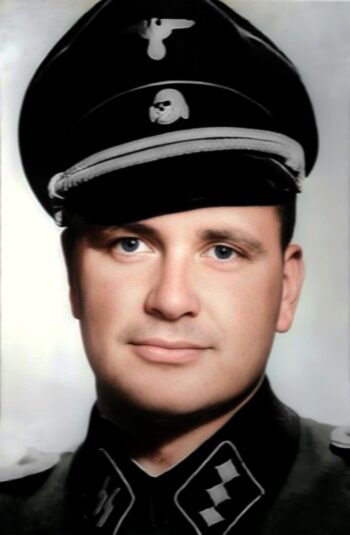Franz, Kurt

Kurt Franz (17 Jan. 1914 – 4 July 1998), SS Oberscharführer, was deployed as a guard at the Buchenwald Camp, and later as a cook at several institutions of the Third Reich’s euthanasia action. In April 1942 he was assigned as a guard at the Belzec Camp. In September 1942, he became deputy commandant of the Treblinka Camp under Franz Stangl. When Stangl left in August 1943, Franz is said to have become camp commandant until the dissolution of the camp in November 1943. Franz, however, denied this, since he was an NCO, unable to take such a leadership position.
Together with nine other defendants, Franz was put on trial in 1964/65 for his involvement in the alleged gas-chamber mass murders at Treblinka, and sentenced to a life-long prison term. Throughout his trial and imprisonment, and even after his release due to poor health in 1993, he insisted that he was innocent and never killed or contributed to killing a Jew. Like the Demjanjuk Show Trial, the Düsseldorf Show Trial against Franz was characterized by some 100 Jewish witnesses telling the most absurd stories, none of which were ever challenged by the defense, and all of which were swallowed completely by the court, and entered as such into the court record. The trustworthiness of these witnesses, or the lack thereof, can be assessed by the critical analysis of their testimonies as summarized in the respective entries. (See the section “Treblinka” of the entry on witnesses.)
This verdict established the legally sealed “self-evident” truth about Treblinka. At the core, the verdict of the Düsseldorf Court states (Mattogno/Graf, pp. 162-169):
“The gas chambers, in which the Jews were killed by means of exhaust fumes of a diesel engine, formed the center of the death camp.”
But Diesel engine exhaust gases have such low toxicity that they are unsuited for the claimed mass murder.
Franz is a typical example of many alleged NS perpetrators who are said to have been sadistic beasts of epic proportion, but seemed absolutely harmless to anyone who ever met them afterwards, showed no signs of remorse or insight, and also exhibited no signs of post-traumatic stress behaviors, as would be expected for men involved in the brutal slaughter of hundreds of thousands of innocent victims. German public prosecutor Helge Grabitz once suggested that the conundrum of the defendants’ strange behavior could be reasonably explained only by assuming that they were indeed innocent – but he immediately rejected this “seductive” explanation as cynical and as flying in the face of the evidence (Grabitz 1986, p. 147). This “evidence,” however, consisted of nothing more than wild, unverified claims by hysterical witnesses testifying in a frenzied public atmosphere of lust for revenge and retribution, and of an obsessive tendency for self-denigration and a self-chastising guilt complex among the Germans.

You need to be a registered user, logged into your account, and your comment must comply with our Acceptable Use Policy, for your comment to get published. (Click here to log in or register.)